Introduction

About the P20 WIN Data Governance Manual
Data governance can be defined as both an organizational process and a structure; it establishes responsibility for data, organizing program area staff to collaboratively and continuously improve data quality through the systematic creation and enforcement of policies, roles, responsibilities, and procedures. As a structure, clear and specific roles and responsibilities are assigned and staff are held accountable for the quality of the data they manage. Ultimately though, data governance is not about who is in charge: it is about identifying existing or potential data problems and fixing them to prevent them from happening or recurring. As a continuous and iterative process, data governance is a systematic way of handling data throughout the information life cycle, from definition to retirement.
The P20 WIN Data Governance Manual details the structure, processes, roles and responsibilities that define its governance. This manual expands on the previous P20 WIN Data Governance Policy, which empowered the P20 WIN Data Governing Board to develop more detailed standards and processes for data management. This is a living document, and will be updated as agency and state priorities evolve. If a new policy is created or an existing policy changed, the Manual will be updated to include a copy of the new policy for reference.
Vision and Purpose
Connecticut developed P20 WIN so that multiple, interagency datasets could be linked securely and simultaneously to create longitudinal views of student experiences into the workforce. Since 2014, the P20Win system has produced interagency data linkages for over twenty projects.
The following list delineates key goals and deliverables for P20 WIN:
- Establish a longitudinal data system that includes supportive services, secondary and postsecondary education, and pathways into the workforce.
- Institute clear high-level, agency-wide sponsorship of data governance
- Integrate accountability for successful data management throughout all levels of each Participating Agency.
- Ensure data security for confidential information at rest and during transmission and the protection of individual privacy.
- Provide clear definitions of user roles, system access and approval processes.
- Link data to address policy questions that would otherwise remain unanswered, through the development of a shared research agenda.
- Introduce governance flexibility to include additional data points and datasets.
In order to successfully coordinate and secure authorized access to data through P20 WIN within state and federal laws and regulations, documents and processes have been developed and approved by participants to the system.
- The Enterprise Memorandum of Understanding (eMOU) is a process document that establishes the governance structure, specifies privacy, breach notification and security requirements, determines the Data Sharing Process, and offers guidance when adding new agencies and changing or updating system processes. The Commissioner or chief executive for each participating agency signs the eMOU to join P20 WIN.
- The Data Sharing Agreement (DSA) is a formal document between the data recipient and each Participating Agency once a Data Request has been approved. This document outlines the specific regulations that define how data are able to be used, responsibilities of each entity in the DSA, specific privacy and security requirements. Exhibits to the DSA include: the approved Data Request form, agency user acknowledgement, confidentiality agreements, data destruction, and the eMOU.
Data Governance Structure
The P20 WIN Data Governance structure has three governing bodies: the Executive Board, the Data Governing Board, and the Resident Advisory Board. These groups represent a three-tier leadership system. The Executive Board has ultimate policy decision-making authority for the P20 WIN Data Sharing process. The Executive Board can create standing or special committees (e.g. legal committee) when necessary. The Data Governing Board enforces policies set forth by the Executive Board related to cross-agency data management, including but not limited to, data confidentiality and security in conformance with applicable law. Finally, the Resident Advisory Board advises and guides the Executive Board and the Data Governing Board on how to communicate the work and mission to State residents.
Together these groups provide a framework for system leadership, implementation and improvement. Independent of the governance structure, Data Stewards are the staff at the Participating Agencies that work closely with the data available for request. Data Stewards from each Participating Agency are encouraged to join the regular Data Stewards meetings to focus on the implementation of system policy and to determine the availability, security and quality of data.
Image
Executive Board
The Executive Board is a multi-agency committee composed of Commissioners and Executive leadership from each of the Participating Agencies. The Executive Board develops the vision for P20 WIN and provides oversight and leadership for the data governance structure. The Executive Board is responsible for sustaining the P20 WIN system by supporting its vision and securing resources to maintain its efficient operation.
While membership within P20 WIN is not restricted to Executive Branch state agencies, the P20 WIN Executive Board Chairperson must be a State official or employee. As Chairperson, they conduct all Executive Board meetings, represent the P20 WIN Data Sharing process, and work with all Participating Agency leaders and political leaders to assure agency-to-agency coordination and to further data sharing to improve services provided to the residents of Connecticut. The Chairperson leads the Executive Board to set the direction for the Data Sharing process and coordinates with the Operating Group to set agendas and resolve operational matters.
Responsibilities:
- Define, develop and advance a vision and supporting policies for the Data Sharing process.
- Expand Data Sharing for the purposes of conducting audits and evaluations of federal and state education programs, research and related planning, and operations and service delivery efforts as determined by the Executive Board and any additional purposes made through statutory changes by the Connecticut General Assembly and approved by the Executive Board.
- Each member shall identify representatives from its respective agency to serve on the Data Governing Board.
- Respond to escalated issues from the Data Governing Board.
- Identify and work to secure resources necessary to sustain the P20 WIN.
- Champion the use, maintenance and improvement of the P20 WIN system by developing policy, leveraging resources and advocating for the Data Sharing process at the state legislature.
- Make recommendations to OPM regarding fiscal and budgetary issues for the system.
- Ensure the proper use of public funds or resources that are to be jointly utilized with stakeholders from private entities (such arrangements are governed by appropriate Data Use License(s)).
- Add, suspend and readmit Participating Agencies in accordance with Appendix 1 of the Enterprise Memorandum of Understanding (eMOU).
The Executive Board meets quarterly on the third Tuesday of the month at 2:00pm, unless otherwise noted. You can find agendas, minutes, and recordings of past meetings in the Governance page of the P20 WIN website.
Data Governing Board
The Data Governing Board consists of one staff member from each Participating Agency who can deliver policy, resource and staffing recommendations to support the Participating Agency in the Data Sharing process. Members work collaboratively to maintain the security of the Data Integration Hub. Once policies and resource commitments are approved by the Executive Board, the Data Governing Board members are responsible for implementing and enforcing these policies.
Responsibilities:
- Provide the appropriate Data from each Participating Agency’s source system to support the overarching Research Agenda.
- Review and approve Data Sharing Requests, data output and resulting publications prior to release.
- Identify, as needed, additional data stewards and subject matter experts to implement and improve the Data Sharing process.
- Provide guidance on the creation of regular reports that utilize the Data Sharing process and are mandated by the legislature.
- Establish a process to annually produce a report on the efforts of P20 WIN to promote equity throughout the data life cycle and its potential impacts on state residents. The report should include an assessment of any algorithms implemented by researchers to ensure the methods do not perpetuate bias of vulnerable groups with state information.
- Maintain a protocol for expanding the Data Sharing system to include additional agencies or data pursuant to Appendix 1 of the E-MOU.
- Develop data standards and data cleansing processes.
- Develop, document and monitor Data Definitions and Metadata for shared Data Elements within the cross-agency Data Dictionary, using State guidance on Metadata standards.
- Evaluate the quality of the technical process for matching data and quality of the data available through the P20 WIN Data Sharing system.
- Develop policies and procedures, including but not limited to policies and procedures to ensure data privacy, confidentiality and security.
- Receive reports of a Breach or a suspected Breach pursuant to Appendix 2, and receive confirmation from Participating Agencies and the Data Integration Hub when the security of their systems has been restored after a Breach. Notification of a Breach to the Data Governing Board does not relieve the Participating Agency and the Data Integration Hub of its responsibilities or possible liabilities under applicable state and federal law, including but not limited to any required notifications that a Breach has occurred and any related notifications required due to a Breach of any shared information, including but not limited to the Attorney General’s Data Security Department.
- Consult with OPM, in accordance with the provisions of C.G.S. §§ 4-67n, 4-67p and 10a-57g and other applicable statutes and policies.
- Manage the amendment process of this E-MOU in accordance with Appendix 3 and Appendix 4.
- Provide guidance to the Executive Board on the future creation of additional centralized enterprise Data matching services, available to the Participating Agencies, in accordance with Appendices 3 and 4.
Member Expectations:
- Represent the interests of their Participating Agency and clients and support the vision and goals of the P20 WIN system.
- Support the state’s vision for data sharing and the P20 WIN.
- Support and advocate for data management and governance practices at their agency.
- Communicate regularly with agency staff regarding activities of P20 WIN.
- Attend and participate in regular monthly Data Governing Board meetings.
- Share any data issues, changes in agency data policies, or new data regulations that could impact P20 WIN with the Data Governing Board and Operating Group.
The Data Governing Board meets every fourth Friday at 8:30am. Meeting agendas, minutes and recordings of past meetings can be found in the Governance section of the P20 WIN website.
Resident Advisory Board
Data sharing by governmental agencies should incorporate the knowledge and expertise of the state residents. Many state agencies have established advisory groups seeking to gain insight from the community and their lived experiences. The Office of Early Childhood has a Parent Cabinet and the 2Gen Advisory Board with a parent engagement component. The Department of Education created the Commissioner’s Roundtable for Family and Community Engagement in Education. The Department of Children and Families has a Data Integration Work Group.
The Executive Board will establish a Resident Advisory Board with members representing residents of Connecticut who receive or have received state services and benefits.The role of Resident Advisory Board is to provide advice and guidance to the Executive Board and the Data Governing Board on how to effectively communicate its work and mission to State residents.
Responsibilities:
- Advise the Participating Agencies in earning public trust in the work of the Data Sharing process.
- Attend Data Governing Board meetings as needed.
- Assist the Data Sharing process to ensure that the P20 WIN promotes equity and that research, evaluation and data sharing efforts do not disparately impact consumers or families.
- Share insight on projects, policies and procedures, and how to prevent any use of data for malevolent purposes, or that might result in profiling or other malevolent impact, specifically on issues of informed consent, assent, notice, privacy, data retention and destruction, and equity in data.
Data Stewards
In alignment with the policies set forth by the Executive Board and Data Governing Board, the Data Stewards work on technical implementation of the Data Sharing system and are responsible for the availability, security and quality of data shared through the Data Integration Hub.
The Data Stewards working group also recommends to the Data Governing Board policies or practices to be developed or improved. Members are then responsible for carrying out the approved data system policies. Data stewards not only represent the interests of their agency, but work to support the state’s overarching vision for the Data Sharing process.
Responsibilities:
- Implement policies and processes as approved by the Data Governing Board.
- Develop, document and monitor data definitions and metadata for shared data elements in a cross-agency data dictionary, using state guidance on metadata standards.
- Evaluate the quality of the technical process for matching data and quality of the data available through the system.
- Make recommendations to the Data Governing Board on policies and procedures that need to be created or improved, including but not limited to policies and procedures to ensure data security and data quality.
Key Processes
Together the P20 WIN data governing bodies work in concert to ensure that the following processes operate smoothly.
| Process | Details |
|---|---|
| Response to data requests | Requests for data from P20 WIN are directed from the Operating Group to the Data Governing Board, which manages the life cycle of the request. This process is outlined in Section 7 of this manual as well as the Data Sharing Playbook. |
| Determination of authorized users and access rights to resultant datasets | In accordance with state and federal law and each data request’s Data Sharing Agreement, the Data Governing Board members representing agencies whose data are in a data request (i) approve the users who are to have access to de-identified unit record data from P20 WIN and (ii) establish the parameters for data dissemination and destruction for each specific data request. |
| Development and maintenance of cross-agency data dictionary | Data Stewards are responsible for ensuring that the data dictionary for each Participating Agency is complete and up-to-date. |
| Establishment of guidelines for data analysis as necessary | The Data Governing Board establishes processes that support a common approach to data analysis for resultant data sets as appropriate. |
| Expansion of P20 WIN | The Executive Board approves a process for adding new state agencies or organizations or additional data so that the technical infrastructure can be expanded and new agencies have representation in the named committees. The process for a new agency to join P20 WIN can be found in Section 3 of this manual or in Appendix 1 of the eMOU. |
| Creation of policies to sustain P20 WIN | The Executive Board establishes policies to sustain and improve P20 WIN including how P20 WIN will be staffed and supported financially. |
| Modification to this policy | The Data Governing Board can make recommendations to modify P20 WIN policies and the eMOU to the Executive Board. |
How to Become a Participating Agency
Any agency that is interested in joining P20 WIN must first submit a memo regarding their intent to join. This document should address the agency’s authority to access and share data and the potential security, privacy, confidentiality, or conflict of interest concerns that might be raised if the agency participates in the Data Sharing process.
Any agency interested in joining P20 WIN will go through the following process:
- Submit a written request to the Executive Board from the chief executive of the interested agency or organization. The request should state why they want to join, what data will be contributed to P20 WIN, their authority to access and share that data, security, confidentiality, and any conflicts of interest.
- The request is routed to the Data Governing Board for review. Their review focuses on the authority of the agency to access and share the data and identifies the potential for security or conflict of interest concerns.
- If any confidentiality or privacy concerns are identified, the request is forwarded to the Operating Group for review.
- If there are no questions and the Data Governing Board chooses to recommend adding the agency as a Participating Agency, their recommendation is sent to the Executive Board for a vote.
- The decision from the Executive Board must be a unanimous vote to accept the recommendation of the Data Governing Board and be considered a newly Participating Agency. If approved, the applicant and all current Participating Agencies must sign the eMOU.
The official process to join can also be found in Appendix 1 of the Enterprise Memorandum of Understanding, which is included at the end of this document.
Operational Roles and Responsibilities
The Operating Group and Data Integration Hub share responsibility in hosting and operating P20 WIN, with the Operating Group serving as the lead agency responsible for the operations and the Data Integration Hub responsible for hosting, linking and transmitting Data.
The Office of Policy and Management serves as the Operating Group for P20 WIN. The Department of Labor serves as the Data Integration Hub and provides data matching services for approved data requests.
Operating Group
The Operating Group facilitates smooth and efficient operation of P20 WIN for the benefit of the Participating Agencies and the greater benefit of the State of Connecticut. The Office of Policy and Management serves as the Operating Group for P20 WIN.
Responsibilities:
- Develop a budget in collaboration with Participating Agencies to support costs associated with ongoing operation, maintenance and improvement of P20 WIN.
- Develop and submit a budget request for the Operating Group and the P20 WIN Data Sharing process costs, based on recommendations from the Executive Board.
- Develop legal documents to distribute funds for the P20 WIN Data Sharing system as defined in the approved budget.
- Provide financial back-office support for managing the receipt and distribution of funds, such as costs related to data requests, according to the fully executed Data Sharing Agreements.
- Provide program management to support the continued operation, maintenance and improvement of the Data Integration Hub as a resource for the Participating Agencies and the State.
- Serve as the primary point of contact for incoming Data Sharing Requests and coordinate communication between Data Recipients and the Participating Agencies as necessary to support the completion of documents required by the Data Sharing process.
- For each approved DSA, facilitates communication between the Data Recipient, Participating Agencies and the Data Integration Hub to ensure the process for fulfilling the terms of the DSA are progressing.
- Provides meeting space and materials for meetings as needed.
- Coordinate and prepare reports on Data Sharing activities and outcomes for legislative and funding stakeholders.
- Facilitates any audits that are requested and required by any Party.
- Implements the fee policy from Data Recipients.
Data Integration Hub
The Department of Labor serves as the Data Integration Hub and provides data matching services for approved data requests.
Responsibilities:
- Enter into Data Sharing Agreements with Participating Agencies and Data Recipients for approved data requests.
- Maintain a secure server that supports approved data matching software and/or methods so that matches can be conducted at optimum speed, privacy, security and accuracy.
- Retain data matching software, implement procedures, and document data matching methods that have been approved by the Data Governing Board for the purpose of facilitating 4. Data requests using the Data Integration Hub.
- Utilize the data matching software and/or methods approved by the Data Governing Board to conduct matches between Data sets from participating agencies for approved Data Sharing Requests.
- Comply with the provisions of the applicable federal and state data security, confidentiality and privacy requirements. Nothing may be construed to allow the Data Integration Hub to maintain, use, disclose, or share data in a manner inconsistent with applicable federal and state laws and regulations or inconsistent with the terms of the eMOU.
- Transmission and storage of all Data received by a Data Integration Hub shall be in full compliance with all state and federal legislative and regulatory requirements related to information security, including but not limited to, commercially-available and widespread precautionary measures, such as firewall implementation, virus scanning, security access control software, encryption of data as it leaves the data boundary, secure tunnels and limitation of physical access to confidential information and personally identifiable information. Upon the written request from a Party, the Data Integration Hub shall disclose and permit a Party to inspect and audit data confidentiality, privacy or security protocols, practices, and policies to ensure compliance with the terms of this E-MOU and applicable federal and state laws.
- The Data Integration Hub shall:
- Only utilize Data received to fulfill an authorized Data Sharing Request pursuant to a Data Sharing Agreement in accordance with applicable federal and state laws and regulations. Authorization given by Participating Agencies via a Data Sharing Agreement to the Data Integration Hub to use Data for one purpose does not confer approval to use it for any other purpose.
- Not re-disclose, duplicate or disseminate (except as necessary to fulfill the stated purpose of a particular Data Sharing Agreement), or convey ownership of any portion of the shared Data and records in any media format without the prior written approval from the particular Participating Agency which provided the Data.
- Transmit all Data via a secure connection approved by the State Information Technology Policy, such as a Virtual Private Network (VPN) or Secure File Transfer Protocol (SFTP) connectivity.
- Only transmit, via electronic mail, Data Sets that have been appropriately de-identified according to applicable privacy, confidentiality, and security requirements, as outlined in the Data Sharing Agreement. No protected Data will be transmitted via electronic mail.
- Take all necessary steps to ensure that any protected identifiable information or other identifiable or confidential Data in the possession or control of the Data Integration Hub are destroyed in a timely fashion as provided in the Data Sharing Agreement; and
- Abide by policies and procedures recommended by the Data Governing Board and adopted by the Executive Board.
Participating Agencies
The State Department of Education (SDE), the Office of Early Childhood (OEC), the Department of Labor (DOL), the Connecticut State Colleges and Universities (CSCU), the University of Connecticut (UCONN), the Connecticut Conference of Independent Colleges (CCIC), the Department of Social Services (DSS), the Department of Children and Families (DCF), the Office of Higher Education (OHE) and the Connecticut Coalition to End Homelessness (CCEH) are actively collaborating to support the P20 WIN System. The system is designed with flexibility to expand and include additional state agencies or organizations such as the Department of Public Health and the Department of Housing. The process for an agency or state organization to join P20 WIN is defined in the “How to Become a Participating Agency” within this manual.
Each participating agency is responsible for the data that reside in their respective systems. The Data Governance Policy does not affect data that is not shared through P20 WIN. Rather, this policy covers only the data that is shared between organizations both at the unit and aggregate level through P20 WIN. While data will be transported, matched and eventually stored electronically, this manual covers the use of shared data in reports and documents whether electronic or in print.
Data Policies
The previous sections outline the key management roles and responsibilities to support and maintain cross-agency data sharing. The following sections describe key data policies that promote data quality, data accuracy, and acceptable use standards.
Data Quality
The quality of the data in the P20 WIN ultimately determines the system’s overall value to state officials and external researchers. The National Center for Education Statistics (NCES) notes that key attributes of data quality are accuracy, completeness, timeliness, validity, and consistency1. Data inaccuracy refers to errors in records that are often the result of poor data entry practices and poor regulation of data accessibility2. Data completeness refers to the degree to which all data is available, which is often measured by the number of missing records3. Data validity refers to whether the data fields actually measure and reflect the systems or outcomes of interest. Data consistency refers to the degree the data is stable across both time and sources.
Integrated data systems must account for data inconsistencies across agencies. For example, an individual’s race as tracked in DSS Medicaid tables may not match the CCEH HMIS race identifier. Nonetheless, strong data governance policies can increase the value of such systems for key stakeholders. The Minnesota’s SLDS Governance Manual notes that “The key to maintaining high quality data is a proactive approach to data governance that requires establishing and regularly updating strategies for preventing, detecting, and correcting errors and misuses of data.”
P20 WIN Participating Agencies providing data do not ensure 100% accuracy of all fields and each Data Recipient accepts the quality of the data as received.4
The Executive Board can establish a data quality committee to introduce strategies to improve data standards. Other states have suggested participating agencies conduct regular data quality audits. For example, Virginia’s State Longitudinal Data System research sub-committee encourages participating agencies to develop some basic data quality reports that show range of values and frequency of missing values to accompany the master Data Dictionary. Other strategies include automatic edit checks that crosscheck the same field from year to year, reports on matching rates, and clean metadata for all possible extracts in the SLDS.
Input File Format
To facilitate identity resolution in an interagency data request, each Participating Agency must structure the input file so that there is one unique record per Individual represented. Data that may have been pulled from a dimensional data source will be flattened to produce an input file in this format. Additionally, the Participating Agency should structure the file with a unique generic ID to each unique record in the file that identifies the Participating Agency which is providing the information.
Participating Agencies Data Stewards should follow the standardized formatting requirements when preparing a data file for matching. The Data Integration Hub has the right to reject any data that does not meet these standards.
For matching files – Files should be in a tab delimited text file. There should not be quotations around text fields.
For analytical files – Files should be in the format requested and approved for the given data request.
Standard naming convention for files and data elements:
The file naming standard for data files transferred via SFTP is as follows:
a. Agency acronym
b. Data Request Number listed in DSA
c. Date file was created (MM_DD_YYYY)
d. Contents of file (matching, analytical, key)
example: “DOL.000.01_01_2000.matching”
The table below identifies the most commonly requested data variables.
| Field/Data Element | Format | Possible Values | Definition | Comment |
|---|---|---|---|---|
| SSN | Text or Varchar(9) | Social security # | With leading zero | |
| DOB | YYYYMMDD | YYYYMMDD | Date of Birth | As a text field |
| Gender | Text or varchar(1) | M = male, F = female, U = unknown | Gender | |
| Race/Ethnicity | ||||
| LastName | Text | |||
| MiddleName | Text | |||
| FirstName | Text | |||
| SASID | Text or varchar(10) | State Assigned Student Identification Number | ||
| HighSchoolCode | Text or varchar(6) | CollegeBoard HS assigned code | Include leading zero | |
| Fake ID | A unique fake identifier to be used |
Metadata and Data Dictionaries
Metadata is structured data about data. High quality metadata provides helpful context about the data’s creation, quality, and uses and is key to improving data discovery. Metadata helps to answer the question “what is the data about?” by providing more detail about various characteristics of the data, including information about the data source, update frequency, and level of detail. Dataset metadata elements should include:
- Human-readable name of the dataset
- A description of what the dataset entails
- The number of rows
- Temporal coverage
- The update frequency
- Any unique identifier
Related guidance for metadata on the open data portal can be found here. Participating Agencies should provide key metadata to accompany the interagency Data Dictionary fields. The Data Governing Board is responsible for developing, documenting and monitoring Data Definitions and Metadata for shared Data Elements within the cross-agency Data Dictionary. The Operating Group works with the Data Governing Board to ensure that the Data Dictionary for each Participating Agency is complete and up-to-date.
Acceptable use
Cross-agency data sharing is for legitimate governmental purposes, which can include evidence-based policy-making, academic research to support the wellbeing of state residents, and mandated, periodic state reporting. Each Participating Agency and the Data Integration Hub can only use Data for the authorized Data Sharing Request purpose and no other purpose in accordance with applicable federal and state law, the P20Win E-MOU and the Data Sharing Agreement. No participating agency, person or entity can maintain, use, disclose or share Data in a manner inconsistent with the terms of the P20Win E-MOU or its Appendices and applicable federal and state laws and regulations. Upon completion of the approved project in a Data Request, all Data must be destroyed as determined by the Participating Agencies in the Data Sharing Agreement. In accordance with applicable law and the P20Win E-MOU, the Data Governing Board establishes the parameters for Data Transmission and Data destruction.
Enterprise Secure File Transport (SFT) Service
User Upload of Data Files to SRR
External users of the SRR program can submit files via HTTPS upload utilizing their account credentials from a Web browsing session.
To access the CT.GOV Secure Transport SIGN IN page, open a Web browser (Mozilla, IE 11, Edge, Safari or Chrome are all compatible with Secure Transport) and navigate to:
https://sft.ct.gov/
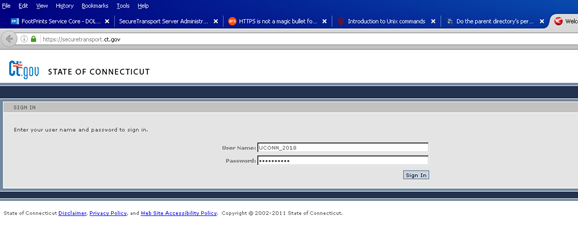
From the SIGN IN Page, user enters their account name and password and clicks “Sign In”
Please note that BOTH “User Name” and “Password” values are CaSE sEnSiTIVe.
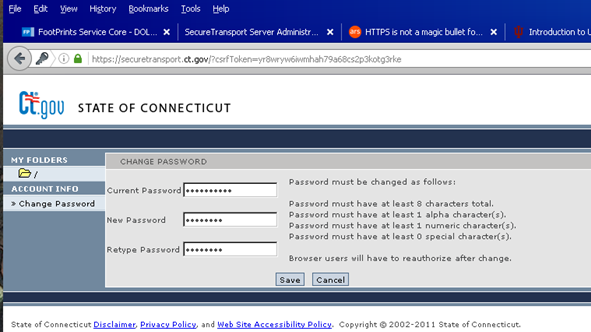
Because we had set the “Require user to change password on next login” when the account was created, the User will be prompted to change their password upon their first login.
- Carefully enter the current password and enter and then re-enter a new password for the account.
Passwords must be at least 7 characters in length and contain at least 1 Alpha and 1 Numeric character.
- Click “Save”.
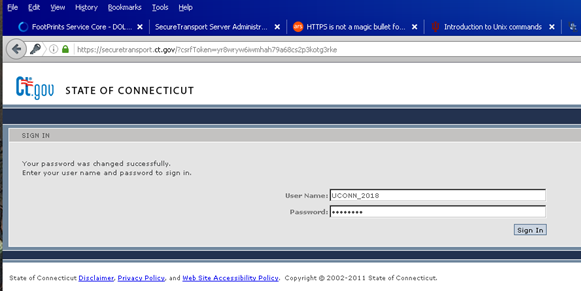
- Re-enter your account name and enter your newly created password and click “Sign In”.
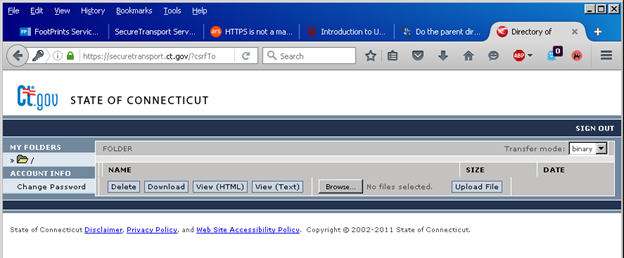
Upon successful authentication, the user is brought to their “home” folder. From this screen, users can:
- Change Password
The change password screen is identical to the screen encountered when prompted to change password upon first login. - Browse their local system to Upload a file
See following example - Download a file from their “home” folder to their local system
See following example - Select a file to View (HTML) or View (Text)
See following example - Delete a file from their “home” folder
See following example - Select a Transfer mode
For client uploads, the default Transfer mode is “Binary” (as opposed to “ASCII”). Binary mode is distinct from ASCII mode
in that it is an exact byte for byte transfer, whereas ASCII will read the data in the file and interpret the data and control
characters to optimize the view of the data on the remote system. - Click on the Folder icon to select a folder (if user has been subscribed to multiple folders)
Example of file browse, upload, view, and deletion
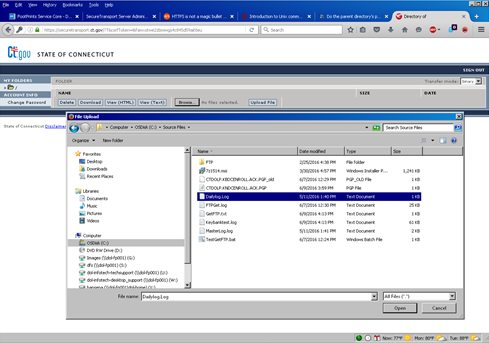
- Click “Browse” to open a file explorer window and browse your local system.
- Click to highlight the file and select “Open” (or double-click the file).
- You may also highlight and select multiple files to upload.

The file name appears next the the “Browse” button, indicating that the file is in focus to be uploaded. If you selected multiple files to upload, you will see “x files”, x indicating the total number of files you have selected. You can click “Upload File” to upload the file from your local system to your home folder in the Secure Transport environment.
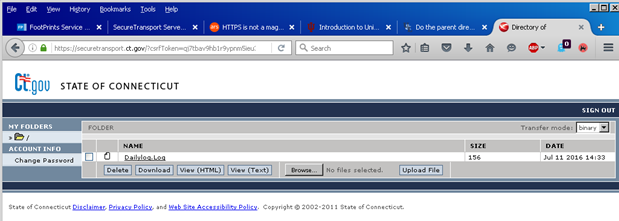
Example of a successful file upload for an SRR account.
- By clicking the check box next to the file, you can then select to “Delete” the file or view the file as either “Text” or “HTML”.
- Selecting to “view” the file will open the file contents in a browser window:
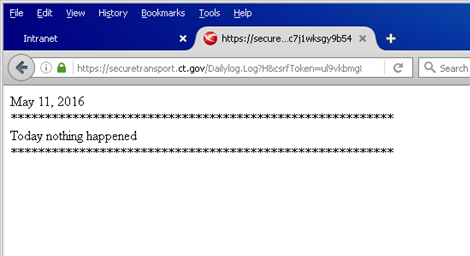
- To return to your “Home” folder, hit the “back” button on your browser.
DO NOT close the tab or browser window as this will terminate your Secure Transport Session abnormally.
Terminating your browser session without using the Sign Out method in Secure Transport will void
your session cookie, requiring you to completely close your web browser, re-launch the browser
and re-authenticate to Secure Transport.
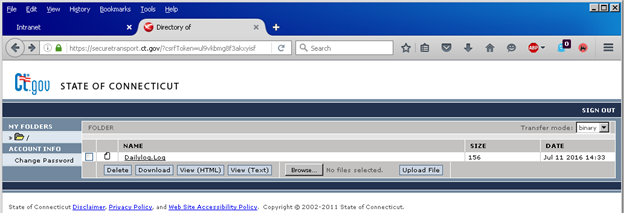
To download a file from your home directory, select the file you wish to perform the action on by enabling the check mark next to the file and click “Download”. Depending upon your browser you may be prompted to View the file or Save the file to your local system. Again, depending upon your browser, your file may be saved by default to a “download” directory in your user profile on your local system.
It is recommended that users are fully familiar with the “download” process for their particular browser and cognizant **
of the location on their local system where browser downloads are stored.**
To delete a file from your home directory, select the file you wish to perform the action on by enabling the check mark next to the file and click “Delete”.
Please note that the Delete method is immediate, and does not prompt you to confirm deletion.Please use the file
‘delete’ method carefully. You may only select and delete 1 file at a time.
Also note that by default, files uploaded to your home target directory are automatically purged from the Secure
Transport system after 60 days.
SRR Quick Reference
| Business Program owner(s) | 200 Folly Brook Boulevard, Wethersfield, CT 06109 Phone: 860-263-6281 Andrew Condon June 29, 2022 |
| Delegated Administrators: | |
| Production Environment | Secure Transport 5.3.0 |
| Administration: | https://159.247.3.180:444/coreadmin/auth/login.jspx |
| User Upload target: | https://SecureTransport.ct.gov |
| Staging Environment | Secure Transport 5.3.0 |
| Administration: | https://159.247.3.179:444/coreadmin/auth/login.jspx |
| User Upload target: | https://SecureTransport.ct.gov |
| Support & Incident Escalation | Secure Transport 5.3.0 |
| DOL Service Desk: | https://dol-ap0141/MRcgi/MRentrancePage.pl |
| DOL Contacts: | Jackie Russo |
| BITS Service Desk: | |
| BITS Contacts: | |
| Additional Resources | |
| AXWAY On-Line Help: | https://159.247.3.180:444/help/Default.htm |
Learning Agenda
All policies and actions of the Data Governing Board shall further the priorities outlined in the P20 WIN Learning Agenda. The Operating Group, with the Participating Agencies, will support the continued progress in each area of focus: college and career success, student readiness, financial aid, workforce training, and overcoming barriers to success. These areas have a broad scope that should allow for a wide array of research projects and involve many of the participating agencies.
The Learning Agenda is subject to change as state and agency data needs evolve; therefore, the Data Governing Board may propose changes to this document for the Executive Board to approve. Agencies are also encouraged to develop agency-specific learning agendas. The agenda can be updated at any time, but the Executive Board conducts an annual review of the agenda at their November meeting.
College and Career Success
The purpose of this research is to provide information to support course placement decisions at colleges and universities and to provide information to families in Connecticut about the probability of admission to four-year institutions.
Student Readiness
It is essential to provide multi-faceted supports so that all students can achieve the highest levels of academic readiness. Research will focus on three critical educational systems/transitions: early childhood to k-12; elementary/middle to high school within K-12; and high school to post-secondary. It is vital for this research to not just include mainstream education data, but also to include social services, child welfare, housing, family life, and adult education data to get a fuller picture of student experiences.
Financial Aid
Connecticut must have a better understanding of the dynamics of financial aid and the outcomes of state financial aid grant recipients so that we can maximize the opportunity for students with limited state resources.
Workforce Training
The success of the state’s workforce education training system, which is critical to the state’s economic development, requires using data to inform decision-making and programming. The state is working to develop standards around measuring the return on investment (ROI) for Connecticut’s public workforce training programs.
Overcoming Barriers to Success
Embedded in each of the prior topics is the need to help individuals who face barriers to success or who are at risk of falling behind due to conditions such as homelessness or engagement with the child welfare system. P20 WIN has expanded to include state agencies that address social services, homelessness, and child welfare. Establishing these connections allows us to understand the degree to which residents face additional challenges and to develop programs that support these students and move individuals and families into cycles of success.
Data Request Process
With support from the Operating Group and the Participating Agencies, the Data Recipient details the intended purpose, identified data content, and security expectations, availability and dependency requirements in the DSA and the Data Sharing Request Form (Exhibit A to the Data Sharing Agreement) which shall address, including but not limited to the following:
- Scope of Project
- What is the proposed Data Sharing project?
- What is the purpose of the Data Sharing Request (and that it meets all Federal and State law requirements for Data Sharing)?
- Does it further the vision, purpose and research agenda of the P20 WIN?
- What specific data fields and elements are to be queried/linked?
- When will the Data Recipient destroy or return the Resultant Data?
- Entities Involved
- Who are the Participating Agencies sharing the data?
- What is the Data Requesting entity?
- Who are the Participating Agency contacts?
- Who are the Data Requesting contacts?
- Identify any applicable federal and state laws and regulations to determine whether all confidentiality/privacy requirements are being met.
- Document the plans for data analysis and reporting of findings from the Resultant Data.
- Data Recipient shall provide information whether the Data Recipient is able to meet the Data security requirements and conduct the Data analysis in a secure environment.
- Determine the Participating Agencies’ confidentiality and privacy requirements, permissions and limitations for Data Recipient’s dissemination or publication of the results before release beyond the Data Recipient(s) named in the DSA.
- Signed approval from Participating Agencies.
Image
Resources for Data Requestors
If a data requestor needs to communicate with a participating agency questions concerning the data, all communications need to occur in a secure environment. For instructions on how to use the secure email platform provided by BITS, please refer to this link. If you are a data requestor, you can request that a state agency initiates a secure email chain.
Appendix A: Definitions
Data definitions mean the plain language descriptions of data elements.
Data dictionary means a listing of the names of a set of data elements, their definitions and additional meta-data that does not contain any actual data, but provides information about the data in a data set.
Data elements mean units of information that are stored or accessed in any data system, such as a student identification number, course code or cumulative grade point average.
Data Integration Hub means the entity that conducts data matching for approved data requests. The CT Department of Labor (DOL) is the Integration Hub for P20 WIN.
Data Stewards means the technical staff at Participating Agencies with knowledge of the available datasets.
Data Governing Board means the board responsible for creating and enforcing policies that support the data sharing process. Each Participating Agency has a representative of the Data Governing Board.
Metadata means the information about a data element that provides context for that data element, such as its definition, storage location, format and size.
Operating Group means the entity serving as the administrative lead agency responsible for the operations of P20 WIN. The CT Office of Policy and Management (OPM) is the Operating Group for P20 WIN.
Participating agency means any entity that has signed the Enterprise Memorandum of Understanding for participation in P20 WIN and has been approved for participation by all other participating agencies.
Preschool through Twenty and Workforce Information Network or “P20 WIN” means a state longitudinal data system for the purpose of matching and linking data of state agencies and other organizations for the purpose of conducting audits and evaluations of federal and state education programs.
P20 WIN means a state data system for the purpose of matching and linking longitudinally data of state agencies and other organizations for the purpose of conducting audits and evaluations of federal and state education programs.
Data Request Management means the review process for each data request submitted to the system. The Data Request Management process is set forth in the P20 WIN Data Request Management Procedure. No data will be included in adata match for any given Participating Agency unless the given Participating Agency has approved the inclusion of its data and has approved the individual(s) or entities who have authority to access the resulting data set.